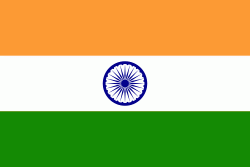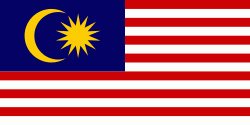Telugu language
Telugu (తెలుగు, ) is a Dravidian language spoken by Telugu people predominantly living in the Indian states of Andhra Pradesh and Telangana, where it is also the official language. It is the most widely spoken member of the Dravidian language family and one of the twenty-two scheduled languages of the Republic of India. It is one of the few languages that has primary official status in more than one Indian state, alongside Hindi and Bengali. Telugu is one of six languages designated as a classical language (of India) by the Government of India.
Telugu is also a linguistic minority in the states of Karnataka, Tamil Nadu, Maharashtra, Gujarat, Chhattisgarh, Orissa, West Bengal, and the union territories of Puducherry and Andaman and Nicobar Islands. It is also spoken by members of the Telugu diaspora spread across countries like United States, Australia, United Kingdom, Canada, New Zealand in the Anglosphere; Myanmar, Malaysia, South Africa, Mauritius; and the Arabian Gulf countries of UAE, Bahrain, Saudi Arabia etc.
With nearly 81 million native speakers as per the 2011 census, Telugu is the fourth most spoken language in India and 15th in the world in the Ethnologue list of languages by number of native speakers. It is also the fastest-growing language in the United States, where there is a large Telugu-speaking community. It is also a protected language in South Africa and is offered as an optional third language in schools in the KwaZulu-Natal province. Roughly 10,000 pre-colonial inscriptions exist in the Telugu language.
Speakers of Telugu refer to it as simply Telugu or Telugoo. Older forms of the name include Teluṅgu and Tenuṅgu. Tenugu is derived from the Proto-Dravidian word *ten ("south") to mean "the people who lived in the south/southern direction" (relative to Sanskrit and Prakrit-speaking peoples). The name Telugu, then, is a result of an "n" to "l" alternation established in Telugu.
Another view holds that Atharvana Acharya in the 13th century wrote a grammar of Telugu, calling it the Trilinga Śabdānusāsana (or Trilinga Grammar). Appa Kavi in the 17th century explicitly wrote that Telugu was derived from Trilinga. Scholar Charles P. Brown made a comment that it was a "strange notion" since the predecessors of Appa Kavi had no knowledge of such a derivation.
George Abraham Grierson and other linguists doubt this derivation, holding rather that Telugu was the older term and Trilinga must be the later Sanskritisation of it. If so the derivation itself must have been quite ancient because Triglyphum, Trilingum and Modogalingam are attested in ancient Greek sources, the last of which can be interpreted as a Telugu rendition of "Trilinga".
Telugu is also a linguistic minority in the states of Karnataka, Tamil Nadu, Maharashtra, Gujarat, Chhattisgarh, Orissa, West Bengal, and the union territories of Puducherry and Andaman and Nicobar Islands. It is also spoken by members of the Telugu diaspora spread across countries like United States, Australia, United Kingdom, Canada, New Zealand in the Anglosphere; Myanmar, Malaysia, South Africa, Mauritius; and the Arabian Gulf countries of UAE, Bahrain, Saudi Arabia etc.
With nearly 81 million native speakers as per the 2011 census, Telugu is the fourth most spoken language in India and 15th in the world in the Ethnologue list of languages by number of native speakers. It is also the fastest-growing language in the United States, where there is a large Telugu-speaking community. It is also a protected language in South Africa and is offered as an optional third language in schools in the KwaZulu-Natal province. Roughly 10,000 pre-colonial inscriptions exist in the Telugu language.
Speakers of Telugu refer to it as simply Telugu or Telugoo. Older forms of the name include Teluṅgu and Tenuṅgu. Tenugu is derived from the Proto-Dravidian word *ten ("south") to mean "the people who lived in the south/southern direction" (relative to Sanskrit and Prakrit-speaking peoples). The name Telugu, then, is a result of an "n" to "l" alternation established in Telugu.
Another view holds that Atharvana Acharya in the 13th century wrote a grammar of Telugu, calling it the Trilinga Śabdānusāsana (or Trilinga Grammar). Appa Kavi in the 17th century explicitly wrote that Telugu was derived from Trilinga. Scholar Charles P. Brown made a comment that it was a "strange notion" since the predecessors of Appa Kavi had no knowledge of such a derivation.
George Abraham Grierson and other linguists doubt this derivation, holding rather that Telugu was the older term and Trilinga must be the later Sanskritisation of it. If so the derivation itself must have been quite ancient because Triglyphum, Trilingum and Modogalingam are attested in ancient Greek sources, the last of which can be interpreted as a Telugu rendition of "Trilinga".
Country
-
India
India, officially the Republic of India (Hindi: ), – "Official name: Republic of India."; – "Official name: Republic of India; Bharat Ganarajya (Hindi)"; – "Official name: Republic of India; Bharat."; – "Official name: English: Republic of India; Hindi:Bharat Ganarajya"; – "Official name: Republic of India"; – "Officially, Republic of India"; – "Official name: Republic of India"; – "India (Republic of India; Bharat Ganarajya)" is a country in South Asia. It is the seventh-largest country by area, the second-most populous country, and the most populous democracy in the world. Bounded by the Indian Ocean on the south, the Arabian Sea on the southwest, and the Bay of Bengal on the southeast, it shares land borders with Pakistan to the west; China, Nepal, and Bhutan to the north; and Bangladesh and Myanmar to the east. In the Indian Ocean, India is in the vicinity of Sri Lanka and the Maldives; its Andaman and Nicobar Islands share a maritime border with Thailand, Myanmar, and Indonesia.
Modern humans arrived on the Indian subcontinent from Africa no later than 55,000 years ago. Their long occupation, initially in varying forms of isolation as hunter-gatherers, has made the region highly diverse, second only to Africa in human genetic diversity. Settled life emerged on the subcontinent in the western margins of the Indus river basin 9,000 years ago, evolving gradually into the Indus Valley Civilisation of the third millennium BCE. By, an archaic form of Sanskrit, an Indo-European language, had diffused into India from the northwest. (a) (b) (c), "In Punjab, a dry region with grasslands watered by five rivers (hence ‘panch’ and ‘ab’) draining the western Himalayas, one prehistoric culture left no material remains, but some of its ritual texts were preserved orally over the millennia. The culture is called Aryan, and evidence in its texts indicates that it spread slowly south-east, following the course of the Yamuna and Ganga Rivers. Its elite called itself Arya (pure) and distinguished themselves sharply from others. Aryans led kin groups organized as nomadic horse-herding tribes. Their ritual texts are called Vedas, composed in Sanskrit. Vedic Sanskrit is recorded only in hymns that were part of Vedic rituals to Aryan gods. To be Aryan apparently meant to belong to the elite among pastoral tribes. Texts that record Aryan culture are not precisely datable, but they seem to begin around 1200 BCE with four collections of Vedic hymns (Rg, Sama, Yajur, and Artharva)." -
Malaysia
Malaysia is a country in Southeast Asia. The federal constitutional monarchy consists of thirteen states and three federal territories, separated by the South China Sea into two regions: Peninsular Malaysia and Borneo's East Malaysia. Peninsular Malaysia shares a land and maritime border with Thailand and maritime borders with Singapore, Vietnam, and Indonesia. East Malaysia shares land and maritime borders with Brunei and Indonesia, and a maritime border with the Philippines and Vietnam. Kuala Lumpur is the national capital, the country's largest city, and the seat of the legislative branch of the federal government. The nearby planned capital of Putrajaya is the administrative capital, which represents the seat of both the executive branch (the Cabinet, federal ministries, and agencies) and the judicial branch of the federal government. With a population of over 32 million, Malaysia is the world's 45th-most populous country. The southernmost point of continental Eurasia is in Tanjung Piai. In the tropics, Malaysia is one of 17 megadiverse countries, home to numerous endemic species.
Malaysia has its origins in the Malay kingdoms, which, from the 18th century on, became subject to the British Empire, along with the British Straits Settlements protectorate. Peninsular Malaysia was unified as the Malayan Union in 1946. Malaya was restructured as the Federation of Malaya in 1948 and achieved independence on 31 August 1957. The independent Malaya united with the then British crown colonies of North Borneo, Sarawak, and Singapore on 16 September 1963 to become Malaysia. In August 1965, Singapore was expelled from the federation and became a separate independent country.
